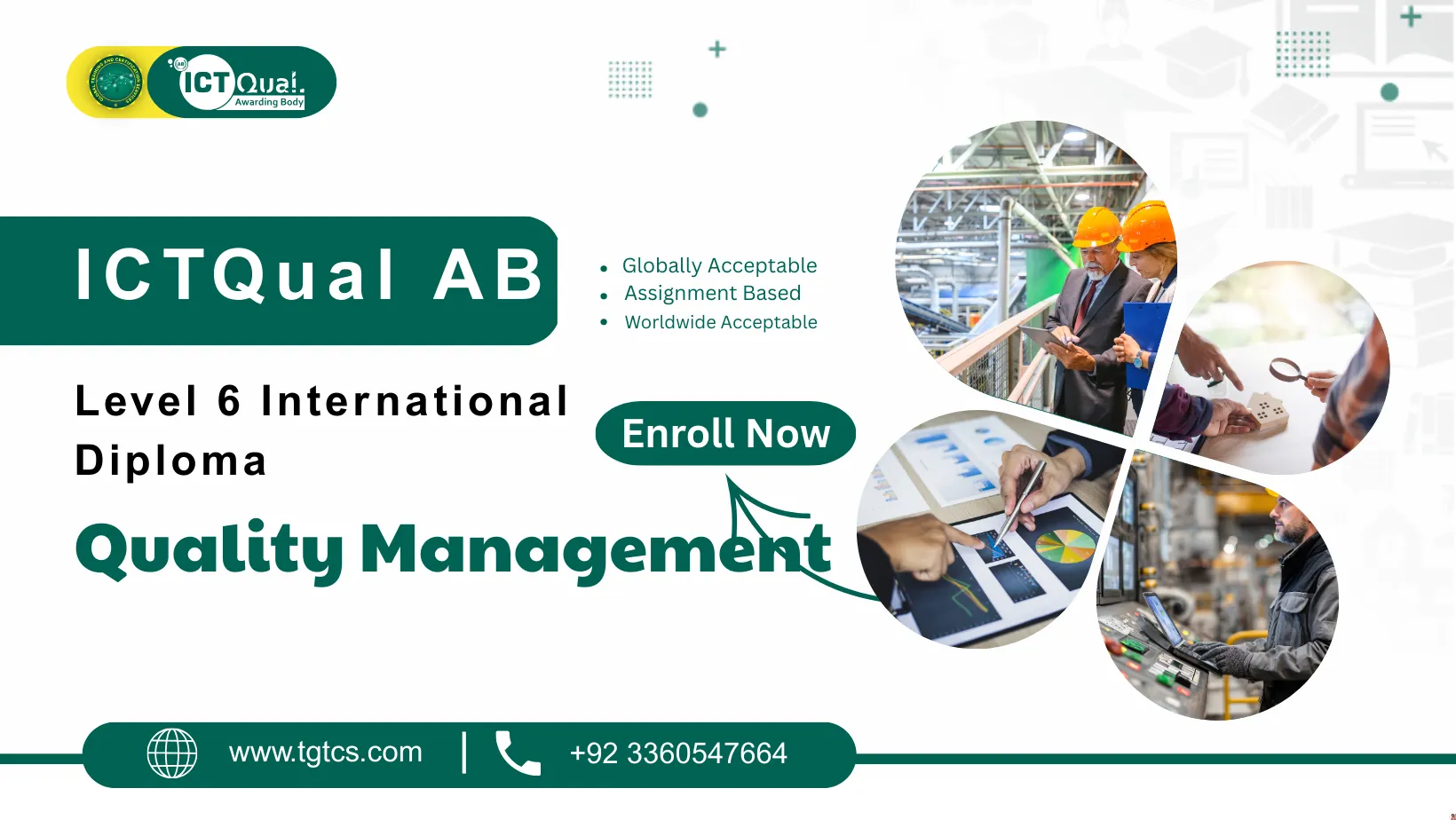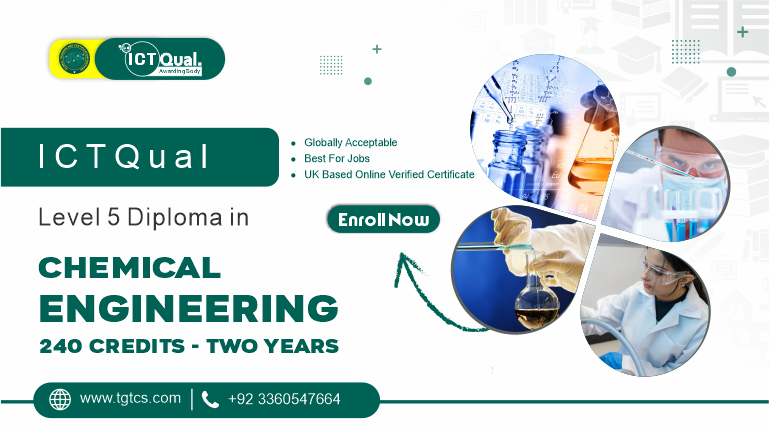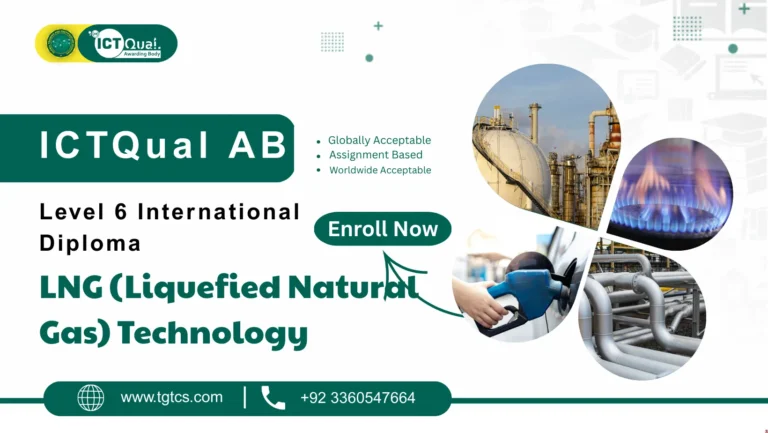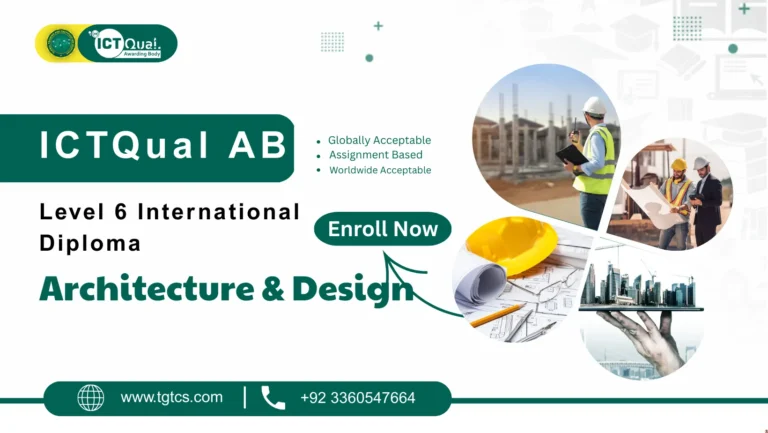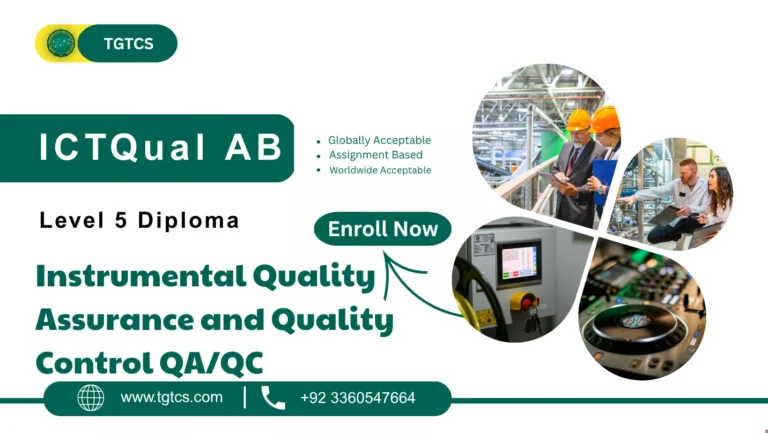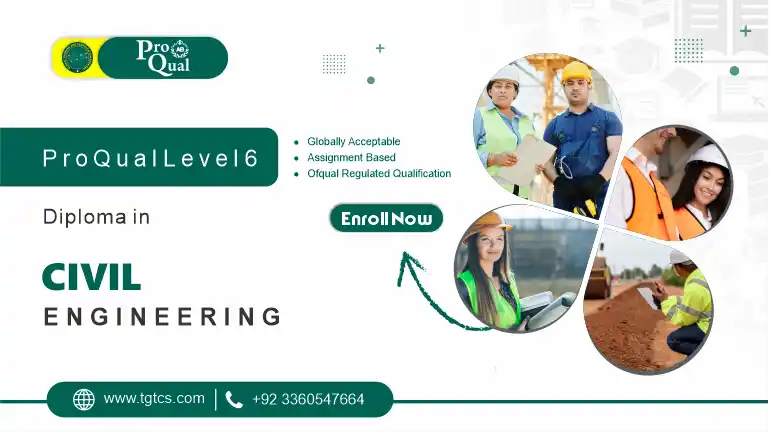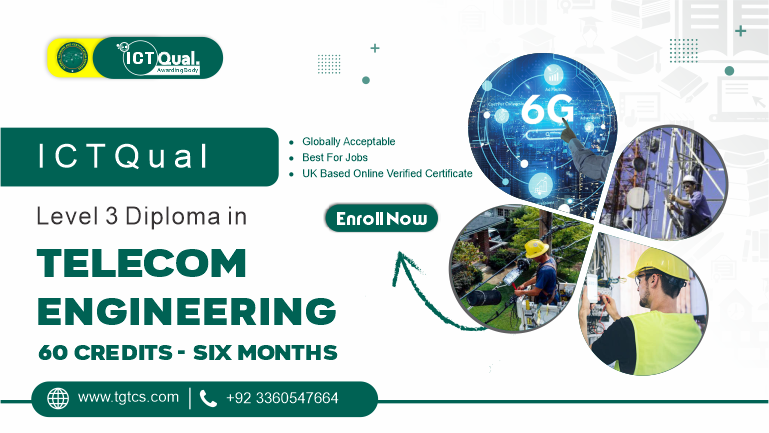ICTQual AB Level 6 International Diploma in Quality Management
In today’s competitive global business environment, the ability to ensure high standards of quality in products, services, and organizational processes is more critical than ever. The ICTQual AB Level 6 International Diploma in Quality Management equips professionals with advanced knowledge and practical skills to implement, manage, and optimize quality management systems across industries worldwide. This British Council-verifiable, MOFA and Embassy-attestable qualification is highly valued for career advancement, job applications, and iqama approval.
This comprehensive program covers the principles, frameworks, and methodologies essential for effective quality management, including Total Quality Management (TQM), ISO standards, risk management, continuous improvement, and performance evaluation. Learners will gain hands-on expertise in auditing, process optimization, compliance, and operational excellence, enabling them to lead quality initiatives that enhance organizational performance and customer satisfaction.
Designed as a fully assignment-based, self-paced diploma, the ICTQual AB Level 6 International Diploma in Quality Management allows professionals to study from anywhere in the world without rigid schedules, making it ideal for working managers, industry practitioners, and ambitious learners seeking flexibility. By completing this 360-credit program, participants develop critical analytical, leadership, and problem-solving skills applicable to multinational organizations and global business operations.
Graduates of this program will be prepared to take on roles such as Quality Manager, Quality Assurance Specialist, Compliance Officer, and Process Improvement Consultant, while also strengthening their credentials for iqama approval and international recognition. With a strong focus on practical application, strategic decision-making, and global quality standards, this diploma ensures learners are equipped to drive excellence and sustainable growth in any organizational context.
The Global Training and Certification Services is Approved Training Centre of ICTQual AB UK Ltd
Course Level and Credits
Level 6 International Diploma, 360 credits.
Suitable for professionals, managers, entrepreneurs, and students seeking advanced knowledge in quality management and international standards.
Mode of Study
Fully assignment-based; learn at your own pace.
Accessible from anywhere in the world, providing flexibility for working professionals and global learners.
Global Recognition & Attestation
British Council verifiable, MOFA and Embassy attested.
Recognized for career advancement, employment, and iqama approval in Gulf countries and other international markets.
Scope and Purpose
Comprehensive coverage of quality management principles, systems, and frameworks, including ISO standards, Total Quality Management (TQM), risk management, auditing, and continuous improvement.
Focuses on both theoretical understanding and practical application in real-world organizational and industrial contexts.
Skills and Knowledge Gained
Implement and manage international quality management systems.
Conduct quality audits, process optimization, and performance evaluation.
Develop leadership, strategic decision-making, and problem-solving skills for multinational business environments.
Apply global quality standards and compliance measures to enhance organizational efficiency and customer satisfaction.
Career Benefits
Opens opportunities in multinational corporations, quality assurance, compliance management, process improvement consulting, and operational excellence roles.
Enhances professional credibility, employability, and career growth in international markets and organizations.
Target Audience
Professionals, quality managers, auditors, entrepreneurs, and students aiming for advanced careers in quality management, operational excellence, and international business standards.
Unique Selling Points (USPs)
Flexible self-paced study, fully assignment-based.
Prestigious and globally recognized Level 6 diploma.
Ideal for career advancement, job opportunities, and iqama approval.
Upon successful completion of the ICTQual AB Level 6 International Diploma in Quality Management, learners will have developed advanced knowledge, practical skills, and strategic competencies to effectively implement, manage, and lead quality management systems in diverse organizational and international business contexts.
Year 1 – Foundations of Quality Management
1. Principles of Quality Management and Assurance
- Understand core principles of quality management and assurance in global business contexts.
- Analyze quality frameworks and standards for operational excellence.
- Apply foundational quality techniques to enhance organizational performance.
- Evaluate methods for measuring and monitoring product and service quality.
- Develop strategies to implement quality assurance systems effectively.
2. Fundamentals of Organisational Excellence
- Identify factors that contribute to organizational excellence and efficiency.
- Analyze organizational structures and culture in quality-driven enterprises.
- Apply best practices for continuous improvement and operational optimization.
- Evaluate organizational performance using quality metrics and benchmarks.
- Develop frameworks for sustaining excellence across business functions.
3. Business Law, Compliance, and Regulatory Frameworks
- Understand relevant business laws, regulations, and compliance requirements.
- Analyze the impact of regulatory frameworks on quality and organizational operations.
- Apply legal and compliance knowledge to quality management processes.
- Evaluate risk and mitigation strategies to ensure regulatory adherence.
- Develop policies to align organizational operations with legal standards.
4. Introduction to Operations and Process Management
- Understand core operations and process management concepts.
- Apply process mapping and workflow optimization techniques.
- Analyze operational efficiency and identify areas for improvement.
- Implement process control measures to enhance quality outcomes.
- Evaluate operations management strategies for organizational effectiveness.
5. Workplace Health, Safety, and Risk Control
- Identify workplace safety standards and regulatory requirements.
- Develop strategies to mitigate occupational hazards and risks.
- Apply health and safety frameworks in operational settings.
- Evaluate risk management practices to ensure employee wellbeing.
- Integrate safety culture into quality management systems.
6. Quality Tools, Techniques, and Measurement Basics
- Understand basic quality tools, techniques, and performance measurement methods.
- Apply tools such as Pareto analysis, cause-and-effect diagrams, and control charts.
- Analyze data to measure quality and identify improvement opportunities.
- Evaluate effectiveness of quality initiatives using measurement metrics.
- Develop strategies for continuous process improvement.
7. Data Analysis and Research Methods in Quality
- Apply quantitative and qualitative research techniques in quality management.
- Collect, analyze, and interpret data to support quality decisions.
- Use statistical tools to evaluate organizational performance.
- Develop evidence-based recommendations for quality improvement.
- Communicate research findings effectively to stakeholders.
8. Business Communication and Professional Reporting
- Develop professional communication skills in business and quality contexts.
- Prepare reports, presentations, and documentation aligned with organizational standards.
- Apply cross-cultural communication techniques for global business environments.
- Evaluate communication strategies to enhance stakeholder engagement.
- Strengthen interpersonal skills for quality leadership roles.
9. Leadership Fundamentals in Quality-Driven Organisations
- Understand leadership principles relevant to quality management.
- Apply motivational and team-building techniques to enhance organizational performance.
- Evaluate leadership models for driving quality initiatives.
- Develop strategies for fostering a culture of excellence.
- Integrate leadership skills into quality and operational management.
10. Information Technology for Quality and Operations
- Understand IT systems and digital tools supporting quality management.
- Apply software and technology solutions for process optimization.
- Evaluate digital solutions for monitoring and improving quality outcomes.
- Ensure data integrity and cybersecurity in quality systems.
- Integrate IT solutions with organizational quality strategies.
11. Problem-Solving and Decision-Making in Business Contexts
- Apply structured problem-solving techniques in operational and quality scenarios.
- Analyze business challenges and develop practical solutions.
- Use critical thinking to support decision-making in complex quality issues.
- Evaluate outcomes of decisions for continuous improvement.
- Develop proactive approaches for organizational problem resolution.
12. Corporate Social Responsibility and Ethical Quality Practices
- Understand CSR principles and their relevance to quality management.
- Develop strategies for ethical and socially responsible business practices.
- Evaluate environmental, social, and economic impacts of quality decisions.
- Apply sustainability frameworks in organizational operations.
- Promote ethical quality practices across business processes.
Year 2 – Applied Quality and Organisational Practices
13. Total Quality Management (TQM) Principles and Applications
- Understand TQM frameworks and their application in organizations.
- Apply TQM tools to enhance operational efficiency and product quality.
- Analyze case studies to implement effective TQM strategies.
- Evaluate continuous improvement methods for organizational growth.
- Develop leadership approaches for quality-focused cultures.
14. Lean Management and Six Sigma Methodologies
- Understand Lean and Six Sigma principles for process optimization.
- Apply DMAIC methodology to identify and solve quality issues.
- Analyze waste reduction techniques to enhance operational efficiency.
- Evaluate process improvement initiatives using Lean tools.
- Develop strategies for sustainable quality enhancement.
15. International Standards and Certification Frameworks (e.g., ISO)
- Understand international quality standards and certification requirements.
- Apply ISO and other frameworks to ensure compliance and operational excellence.
- Evaluate organizational readiness for certification audits.
- Develop policies and procedures aligned with global standards.
- Integrate international standards into organizational quality systems.
16. Advanced Risk Management and Compliance in Quality Systems
- Identify potential risks in quality and operational processes.
- Apply risk assessment and mitigation strategies for global operations.
- Evaluate compliance with legal and regulatory frameworks.
- Develop proactive risk management plans.
- Integrate risk management into continuous improvement initiatives.
17. Performance Management and Organisational Measurement
- Develop KPIs and performance metrics for quality and operational efficiency.
- Apply measurement frameworks to evaluate organizational performance.
- Analyze data to inform strategic and operational decisions.
- Evaluate employee and process performance against organizational goals.
- Implement performance improvement initiatives.
18. Human Resource Management in Quality-Focused Organisations
- Understand HR strategies for promoting quality and operational excellence.
- Apply talent management, training, and development practices to support quality culture.
- Evaluate employee performance and align with organizational quality objectives.
- Develop HR policies supporting compliance and quality standards.
- Integrate human capital strategies into quality management frameworks.
19. Supply Chain Quality and Vendor Management
- Apply quality management principles in supply chain operations.
- Evaluate vendor performance and compliance with quality standards.
- Develop supplier quality assurance strategies.
- Analyze logistics and procurement processes for continuous improvement.
- Integrate supply chain quality management into organizational operations.
20. Quality Auditing and Continuous Improvement Processes
- Conduct internal and external quality audits.
- Analyze audit findings to identify improvement opportunities.
- Apply continuous improvement methodologies for operational excellence.
- Evaluate the effectiveness of corrective and preventive actions.
- Develop audit plans aligned with organizational quality goals.
21. Project and Programme Management in Quality Environments
- Apply project management principles to quality-focused initiatives.
- Plan, execute, and monitor projects for process optimization.
- Evaluate project outcomes for impact on organizational quality.
- Apply tools and techniques for effective program management.
- Develop risk management plans for project and program execution.
22. Strategic Marketing and Quality in Global Markets
- Understand the role of quality in global marketing strategies.
- Apply quality-driven approaches to enhance brand reputation and customer satisfaction.
- Analyze market demands and implement quality-focused marketing strategies.
- Evaluate marketing initiatives for global competitiveness.
- Develop strategic plans integrating quality into international business growth.
23. Ethics, Governance, and Sustainability in Quality Systems
- Understand ethical principles in quality and organizational management.
- Evaluate governance frameworks supporting quality objectives.
- Develop sustainability strategies aligned with organizational goals.
- Apply ethical decision-making in quality and operational contexts.
- Assess the long-term impact of quality initiatives on society and environment.
24. Innovation and Change Management for Quality Professionals
- Develop strategies for innovation in quality processes and systems.
- Apply change management frameworks to implement quality improvements.
- Evaluate organizational readiness for transformation initiatives.
- Integrate continuous improvement and innovation in operational practices.
- Lead change initiatives to enhance quality culture and efficiency.
Year 3 – Advanced Strategic Quality Leadership
25. Strategic Management for Quality and Business Growth
- Formulate strategic plans integrating quality management into organizational growth.
- Analyze competitive environments to enhance quality performance.
- Evaluate strategic initiatives for operational efficiency and market advantage.
- Apply performance measurement tools to assess effectiveness.
- Develop leadership approaches for driving quality excellence.
26. Advanced Quality Theories, Models, and Practices
- Understand contemporary quality management theories and models.
- Apply advanced practices to improve organizational performance.
- Evaluate global quality trends and best practices.
- Develop strategies for sustainable quality and operational excellence.
- Integrate theoretical frameworks into practical quality initiatives.
27. Global Excellence Frameworks (EFQM, Baldrige, etc.)
- Understand international excellence models and benchmarking frameworks.
- Apply EFQM, Baldrige, and other frameworks to evaluate organizational performance.
- Analyze gaps in quality and operational processes.
- Develop improvement plans to achieve global excellence recognition.
- Implement frameworks to drive sustainable competitive advantage.
28. Leadership, Change, and Organisational Transformation
- Develop transformational leadership skills for quality-driven organizations.
- Apply change management methodologies to foster innovation and operational excellence.
- Evaluate leadership approaches for managing resistance and cultural shifts.
- Lead teams through strategic transformation initiatives.
- Integrate leadership and quality practices for long-term organizational growth.
29. Quality in Digital Transformation and Smart Technologies
- Understand the impact of digital technologies on quality management.
- Apply digital tools and smart technologies to optimize processes.
- Evaluate IT-enabled solutions for operational efficiency and quality enhancement.
- Develop strategies for integrating Industry 4.0 practices into quality systems.
- Lead digital transformation initiatives to support organizational objectives.
30. International Trade, Policy, and Quality Assurance
- Understand the link between quality management and international trade regulations.
- Apply quality standards to ensure compliance in global business operations.
- Evaluate policies impacting cross-border quality and operational performance.
- Develop strategies for international quality assurance and certification.
- Ensure adherence to global regulatory frameworks in trade and quality management.
31. Crisis Management and Business Continuity in Quality Systems
- Identify potential crises affecting organizational quality and operations.
- Develop risk assessment and mitigation strategies.
- Apply business continuity frameworks to maintain operational resilience.
- Evaluate crisis response and recovery plans for quality systems.
- Integrate proactive risk management into organizational practices.
32. Emerging Trends in Global Quality and Sustainability
- Analyze emerging trends in quality management and sustainability.
- Evaluate innovations and best practices in operational excellence.
- Apply sustainable strategies to improve environmental and social outcomes.
- Develop approaches to adapt organizational quality systems to future challenges.
- Integrate continuous improvement and sustainability for competitive advantage.
33. Advanced Research Methods in Quality and Organisational Studies
- Apply advanced research methodologies for quality management analysis.
- Conduct quantitative and qualitative research in organizational and quality contexts.
- Analyze data to derive actionable insights for decision-making.
- Develop structured research proposals and reports.
- Communicate findings effectively for academic and professional purposes.
34. Dissertation / Final Research Project in Quality Management
- Conduct independent research on a relevant quality management topic.
- Apply theoretical frameworks and research methods to solve real-world issues.
- Analyze data and draw evidence-based conclusions.
- Develop professional report writing and presentation skills.
- Demonstrate mastery of knowledge and practical application in quality management.
35. Global Business Strategy and Competitive Advantage through Quality
- Formulate strategies to achieve competitive advantage using quality management.
- Analyze industry trends, market dynamics, and competitor practices.
- Apply strategic tools to evaluate organizational performance and growth opportunities.
- Integrate quality management into global business strategy.
- Develop initiatives for market expansion, innovation, and operational excellence.
36. Future of Quality Management and Industry 4.0 Integration
- Identify future trends in quality management and smart technologies.
- Evaluate the impact of digitalization, AI, and Industry 4.0 on operational excellence.
- Develop strategies to adapt to future business and quality challenges.
- Apply forward-thinking approaches to sustain organizational competitiveness.
- Integrate advanced quality practices for long-term growth and efficiency.
Mandatory Unit
This qualification, the ICTQual AB Level 6 International Diploma in Quality Management, consists of 36 mandatory units.
Year 1 – Foundations of Quality Management
- Principles of Quality Management and Assurance
- Fundamentals of Organisational Excellence
- Business Law, Compliance, and Regulatory Frameworks
- Introduction to Operations and Process Management
- Workplace Health, Safety, and Risk Control
- Quality Tools, Techniques, and Measurement Basics
- Data Analysis and Research Methods in Quality
- Business Communication and Professional Reporting
- Leadership Fundamentals in Quality-Driven Organisations
- Information Technology for Quality and Operations
- Problem-Solving and Decision-Making in Business Contexts
- Corporate Social Responsibility and Ethical Quality Practices
Year 2 – Applied Quality and Organisational Practices
- Total Quality Management (TQM) Principles and Applications
- Lean Management and Six Sigma Methodologies
- International Standards and Certification Frameworks (e.g., ISO)
- Advanced Risk Management and Compliance in Quality Systems
- Performance Management and Organisational Measurement
- Human Resource Management in Quality-Focused Organisations
- Supply Chain Quality and Vendor Management
- Quality Auditing and Continuous Improvement Processes
- Project and Programme Management in Quality Environments
- Strategic Marketing and Quality in Global Markets
- Ethics, Governance, and Sustainability in Quality Systems
- Innovation and Change Management for Quality Professionals
Year 3 – Advanced Strategic Quality Leadership
- Strategic Management for Quality and Business Growth
- Advanced Quality Theories, Models, and Practices
- Global Excellence Frameworks (EFQM, Baldrige, etc.)
- Leadership, Change, and Organisational Transformation
- Quality in Digital Transformation and Smart Technologies
- International Trade, Policy, and Quality Assurance
- Crisis Management and Business Continuity in Quality Systems
- Emerging Trends in Global Quality and Sustainability
- Advanced Research Methods in Quality and Organisational Studies
- Dissertation / Final Research Project in Quality Management
- Global Business Strategy and Competitive Advantage through Quality
- Future of Quality Management and Industry 4.0 Integration
The “ICTQual AB Level 6 International Diploma in Quality Management” offers numerous benefits to individuals seeking to advance their careers. Here are some key advantages:
Enhances Career Prospects
- Opens opportunities for roles such as Quality Manager, Quality Assurance Specialist, Compliance Officer, Process Improvement Consultant, and Operational Excellence Leader.
- Strengthens employability and credibility in multinational corporations and international organizations.
Global Recognition & Attestation
- British Council verifiable and MOFA & Embassy attested.
- Recognized for career advancement, job applications, and iqama approval in Gulf countries and international markets.
Advanced Knowledge and Skills
- Develop expertise in quality management systems, ISO standards, Total Quality Management (TQM), Lean, and Six Sigma methodologies.
- Gain practical skills in auditing, process optimization, risk management, and performance measurement.
Strategic Leadership Development
- Enhance leadership, decision-making, and problem-solving capabilities.
- Equip yourself to lead quality initiatives, organizational transformation, and continuous improvement strategies.
Flexible Learning Approach
- Fully assignment-based and self-paced; study from anywhere in the world at your own convenience.
- Ideal for working professionals, managers, entrepreneurs, and global learners seeking flexible advancement opportunities.
Practical Application and Industry Relevance
- Apply theoretical knowledge to real-world business, manufacturing, and service contexts.
- Develop strategies to improve operational efficiency, customer satisfaction, and organizational performance.
Future-Proof Skills
- Learn to integrate digital tools, smart technologies, and Industry 4.0 practices into quality management.
- Stay updated with emerging trends, sustainability, and global quality standards for long-term career growth.
The “ICTQual AB Level 6 International Diploma in Quality Management” is ideally suited for a specific audience, including:
Professionals Seeking Career Growth
- Quality managers, auditors, compliance officers, and operations supervisors aiming to enhance their expertise and leadership in quality management.
- Professionals looking for global recognition, career advancement, and eligibility for iqama approval.
Aspiring Leaders and Entrepreneurs
- Individuals seeking to establish or improve quality systems in their own businesses.
- Entrepreneurs aiming to implement operational excellence and international quality standards to gain competitive advantage.
Students and Graduates
- Recent graduates or students with a background in business, engineering, operations, or management who wish to specialize in quality management.
- Learners aspiring to build a strong foundation in international quality standards, compliance, and process optimization.
Global Learners Seeking Flexibility
- Professionals and students who require a fully assignment-based, self-paced program that can be completed from anywhere in the world.
- Individuals balancing work, study, or other commitments while aiming to achieve an internationally recognized Level 6 diploma.
Professionals Focused on Operational Excellence
- Learners interested in process improvement, Lean, Six Sigma, TQM, risk management, and sustainable quality practices.
- Individuals seeking practical skills applicable in multinational corporations, manufacturing, service industries, and global business environments.
Forward-Thinking and Technology-Oriented Learners
- Those looking to integrate digital tools, smart technologies, and Industry 4.0 practices into quality management systems.
- Learners committed to continuous improvement, innovation, and staying updated with emerging global quality trends.
Course Overview
Course Level
Level 6
Course Units
36 Units
Credits
360
Duration
3 years
